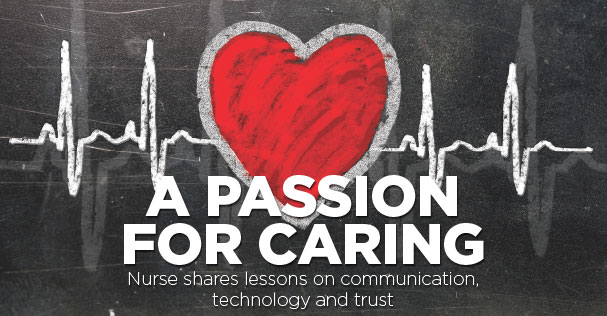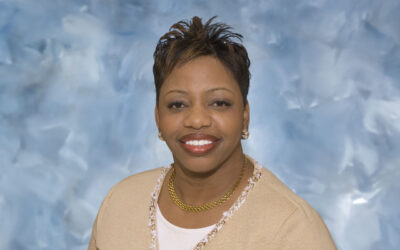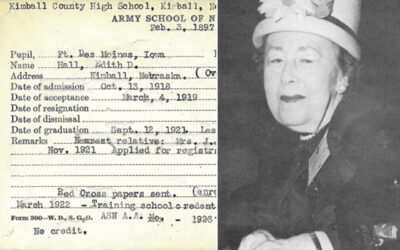A Passion for Caring: Nurse shares lessons on communication,technology and trust
by Matt Skoufalos
Even after 40-plus years, Joyce P. Miller, DNP, RN, couldn’t see herself in any other profession than nursing.
 “I have always wanted to be a nurse,” she said, “even when I was in high school. I’m not sure where it came from, but there was always this passion to care for people.”
“I have always wanted to be a nurse,” she said, “even when I was in high school. I’m not sure where it came from, but there was always this passion to care for people.”
Since Miller attended nursing school in the 1970s, her career included a 38-year turn at the Mayo Clinic in Rochester, Minn., with more than 25 years in the operating room. She then transferred into a teaching role at Augsburg College in Minneapolis, Minn.
“I remember not knowing much about the operating room when I first applied,” she said. “I just knew that I needed a change … and I remember thinking ‘What a tremendous opportunity and what a tremendous learning curve.’ ”
One of the things Miller observed during her time working in the hospital was the need for families to get a greater degree of clarity about what happens in the operating room.
She recalls hearing family members of surgical patients say that the OR is “kind of like this mystery place” for them. Comments like that prompted her to began a pilot program with five orthopedists on staff to become a nurse communicator.
“That was a really unique piece of perioperative nursing that most people don’t think about,” Miller said. “We provided updates when the patients went into the operating room. For a couple years I continued to grow the program and now it’s a thriving program, and very, very well-received. Families love it.”
Providing that depth of communication to families of patients is important, Miller said, not only because the complexity of their cases is ever-increasing, but also because of the speed with which they are admitted to and released from the hospital.
“I think a big piece of nursing is really caring for the patient and understanding the patient well enough to say, ‘What makes you heal, what makes you feel better?’ ” Miller said. “The complexity of their illnesses; their acuity level is so much higher, and nurses really need to be educated to know that it’s more than the disease.”
“You really have to take a look at the person as a holistic human being,” she said. “We can’t do a cookie-cutter approach to care; every patient isn’t the same; every person needs something different. To really help them and provide care that’s unique to that individual is really tough to do when you’re taking care of multiple patients.”
In addition to offering differentiated care, Miller said, nurses should be approaching the delivery of care with an eye toward global health and wellness, “because it’s not just the illness” that providers should be treating.
At Augsburg College, where Miller is an assistant professor, students can attend master’s and doctorate-level courses in trans-cultural nursing, where environmental issues weigh more heavily on professionals’ decision-making than in the hospital setting.

“How do you discharge a patient who’s homeless?” Miller said. “It’s great to think about [how] you need this medication, but realistically, how can you afford this medication? And then the doctors wonder why they’re noncompliant.”
Miller emphasizes that nurses should work foremost on developing a rapport of trust with their patients rather than speaking to them from a position of authority. Without trust and an open dialogue, she said, nurses might not have an accurate concept of how likely a patient is to succeed with a given course of care.
“Physicians will see a patient, and they’ll get out their little book and say, ‘Yep, this is the best diagnosis, the best treatment for this,’ and say, ‘This is what you need to do,’ ” Miller said. “But until you talk to the patient and understand what else do they do, how does that complement or not complement what the physician is recommending for them?”
“I say to the nurses: your patients are the lessons you need to learn from, and they know what helps them.” Miller added. “Is this something that they realistically can do, and if not, what is it that would help?”
For an example, Miller cites a pair of health commons projects in which she participates. One serves the homeless community, and the other caters to the needs of the significant Somali population in her area.
 She tells the story of a Somali woman who came to the commons looking for some clarity on her prescriptions — she had been issued 18 bottles of blood pressure medication from various trips to the clinic. Together with a Somali physician volunteer, Miller said, they worked out the best course of action for her care.
She tells the story of a Somali woman who came to the commons looking for some clarity on her prescriptions — she had been issued 18 bottles of blood pressure medication from various trips to the clinic. Together with a Somali physician volunteer, Miller said, they worked out the best course of action for her care.
“When I talk about healthcare and the complexity of care, it’s really understanding and making sure that that patient understands, and is going to do the follow-up,” she said. “Language barriers make it even more complex because people don’t want to be rude, and they want to be polite; ‘The physician knows so I’m just going to nod and say yes.’ ”
Technology and patient care can clash just as easily as any language barrier, Miller added. Although electronic medical records are convenient, portable (and federally mandated), she says they can threaten to remove nurses from “the caring aspect” of patient interaction.
“Sometimes the hospitals design the computer so that the physician is facing the computer instead of looking at you,” Miller said. “So, as a nurse, you need to really focus on that care and that relationship with the patient. But I think it’s so easy and people get into that little routine of click, click, click, task, task, task, that they sometimes forget how important it is to build that relationship with that patient.”
“Some of those healing practices, we’ve got to make sure we still do them,” she said; “that we take them back; that we don’t give them away because of technology or the task versus the care.”









